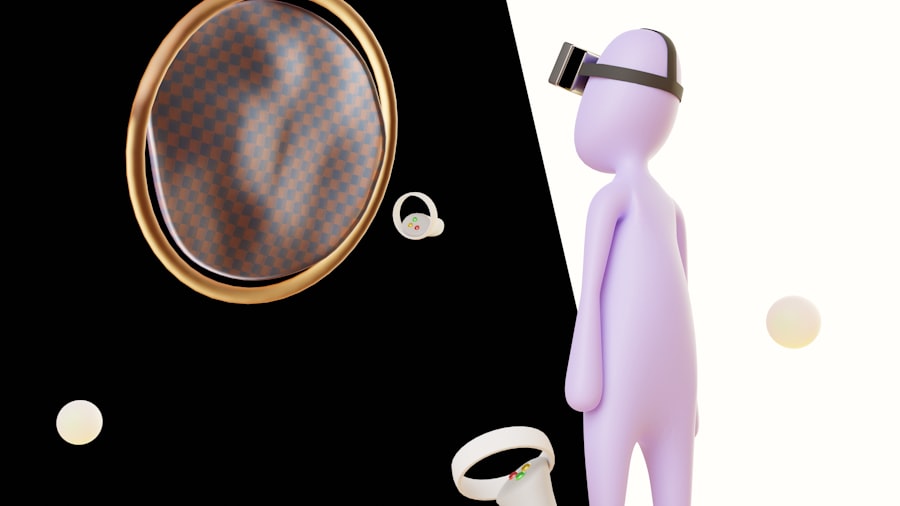Depersonalization and derealization are psychological phenomena that can leave individuals feeling detached from themselves or their surroundings. When you experience depersonalization, you may feel as though you are an observer of your own life, as if you are watching yourself from a distance. This sensation can be unsettling, leading to a sense of disconnection from your thoughts, feelings, and even your physical body.
You might find yourself questioning your identity or feeling as though you are not in control of your actions, which can be deeply distressing. On the other hand, derealization involves a sense of unreality regarding your environment. You may perceive the world around you as strange or distorted, as if you are living in a dream or a movie.
Everyday objects may seem unfamiliar, and familiar places can feel alien.
Both depersonalization and derealization can occur independently or together, often triggered by stress, trauma, or overwhelming emotions.
Key Takeaways
- Depersonalization is a mental health condition characterized by feeling detached from oneself, while derealization involves feeling detached from the surrounding environment.
- Common symptoms of depersonalization include feeling like an outside observer of one’s thoughts and actions, and feeling emotionally numb.
- Common symptoms of derealization include feeling like the world is distorted or unreal, and experiencing a sense of detachment from one’s surroundings.
- Causes of depersonalization and derealization can include trauma, stress, anxiety, and substance abuse.
- Depersonalization and derealization can affect daily life by causing difficulties in relationships, work, and overall functioning, and can lead to feelings of isolation and distress.
Common Symptoms of Depersonalization
When you experience depersonalization, several symptoms may manifest, each contributing to the overall feeling of disconnection. One common symptom is the sensation of being outside your body, as if you are watching yourself from a distance. This can lead to feelings of unreality and confusion about your identity.
You might also experience emotional numbing, where your feelings seem dulled or muted, making it challenging to connect with others or even with your own emotions. Another symptom is the alteration of sensory perceptions. You may notice that sounds seem muffled or that colors appear less vibrant than usual.
This distortion can make it difficult for you to engage with your environment fully. Additionally, you might struggle with memory lapses or a sense of time distortion, where moments feel elongated or compressed. These symptoms can create a cycle of anxiety and fear, as you grapple with the unsettling nature of your experiences.
Common Symptoms of Derealization

Derealization presents its own set of symptoms that can be equally disorienting. One prevalent symptom is the feeling that your surroundings are unreal or dreamlike. You may find that familiar places appear strange or distorted, leading to a sense of alienation from your environment.
This can make it challenging for you to navigate everyday situations, as the world around you feels unpredictable and unfamiliar. Another symptom is the perception that people around you are not quite real or that they lack depth. Conversations may feel superficial, and interactions can seem disconnected.
This can lead to feelings of isolation and loneliness, as you struggle to connect with those around you. Additionally, derealization can cause visual distortions, such as objects appearing larger or smaller than they are. These experiences can be frightening and may contribute to a heightened sense of anxiety as you try to make sense of your reality.
Causes of Depersonalization and Derealization
| Cause | Description |
|---|---|
| Stress | High levels of stress or traumatic events can trigger depersonalization and derealization. |
| Drug Use | Psychoactive drugs, such as marijuana, LSD, or ecstasy, can induce these symptoms. |
| Psychological Disorders | Conditions like anxiety, depression, or PTSD can be associated with depersonalization and derealization. |
| Brain Injury | Head injuries or neurological conditions may lead to these dissociative experiences. |
The causes of depersonalization and derealization are complex and multifaceted. Often, these experiences are linked to significant stressors or traumatic events in your life. For instance, if you have experienced a traumatic incident, such as an accident or abuse, your mind may employ depersonalization as a coping mechanism to protect you from overwhelming emotions.
This dissociative response allows you to distance yourself from the pain associated with the trauma. Additionally, anxiety and panic disorders can trigger episodes of depersonalization and derealization. When faced with intense anxiety, your mind may resort to these dissociative states as a way to manage overwhelming feelings.
Substance use can also play a role; certain drugs or alcohol can induce feelings of detachment and unreality. Understanding these underlying causes is crucial for addressing the symptoms effectively and finding appropriate treatment options.
How Depersonalization and Derealization Affect Daily Life
Living with depersonalization and derealization can significantly impact your daily life and overall well-being. You may find it challenging to engage in social situations or maintain relationships due to the persistent feelings of disconnection. This can lead to isolation and loneliness, as friends and family may struggle to understand what you’re experiencing.
The fear of being judged or misunderstood can further exacerbate these feelings, creating a cycle of withdrawal. Moreover, your ability to perform daily tasks may be compromised. Simple activities like driving, working, or even grocery shopping can become daunting when reality feels distorted.
You might find yourself second-guessing your actions or feeling overwhelmed by sensory input. This constant state of unease can lead to increased anxiety and stress, making it difficult for you to find joy in everyday experiences.
Diagnosing Depersonalization and Derealization

Diagnosing depersonalization and derealization typically involves a comprehensive evaluation by a mental health professional. During this process, you will likely discuss your symptoms in detail, including their frequency and duration. The clinician may ask about any traumatic experiences or significant stressors in your life that could contribute to your symptoms.
It’s essential to provide honest and thorough information to help them understand your situation better. In some cases, standardized questionnaires or assessments may be used to gauge the severity of your symptoms and their impact on your daily life. The clinician will also rule out other potential causes for your experiences, such as medical conditions or substance use disorders.
A proper diagnosis is crucial for developing an effective treatment plan tailored to your specific needs.
Treatment Options for Depersonalization and Derealization
Treatment options for depersonalization and derealization vary depending on the severity of your symptoms and their underlying causes. Psychotherapy is often the first line of treatment, with cognitive-behavioral therapy (CBT) being particularly effective for many individuals. CBT helps you identify negative thought patterns and develop coping strategies to manage anxiety and stress associated with depersonalization and derealization.
In some cases, medication may be prescribed to help alleviate symptoms. Antidepressants or anti-anxiety medications can be beneficial in managing underlying conditions that contribute to dissociative experiences. However, medication is typically used in conjunction with therapy for optimal results.
It’s essential to work closely with your healthcare provider to determine the best course of action for your unique situation.
Coping Strategies for Depersonalization and Derealization
Coping with depersonalization and derealization requires a multifaceted approach that includes both self-care practices and therapeutic techniques. Grounding exercises can be particularly helpful in reconnecting with reality when you feel detached. Techniques such as focusing on your breath, engaging in physical activities, or using sensory stimuli (like holding an ice cube) can help anchor you in the present moment.
Mindfulness practices can also be beneficial in managing symptoms. By cultivating awareness of your thoughts and feelings without judgment, you can create a sense of acceptance around your experiences. Journaling about your feelings may provide an outlet for expression and help you process what you’re going through.
Additionally, establishing a support network of friends or family who understand your experiences can provide comfort during difficult times.
Understanding the Connection Between Depersonalization, Derealization, and Mental Health Disorders
Depersonalization and derealization often coexist with various mental health disorders, creating a complex interplay between symptoms. Conditions such as anxiety disorders, depression, post-traumatic stress disorder (PTSD), and borderline personality disorder frequently feature dissociative symptoms as part of their clinical presentation. Understanding this connection is vital for effective treatment since addressing the underlying mental health issues can significantly reduce dissociative experiences.
Moreover, individuals who have experienced trauma are at a higher risk for developing depersonalization and derealization symptoms as coping mechanisms.
Seeking Support for Depersonalization and Derealization
Seeking support is an essential step in managing depersonalization and derealization effectively. Connecting with mental health professionals who specialize in dissociative disorders can provide valuable insights into your experiences and help you develop coping strategies tailored to your needs. Support groups can also offer a sense of community where you can share your experiences with others who understand what you’re going through.
Additionally, reaching out to friends or family members who are supportive can create a safe space for discussing your feelings without fear of judgment. Open communication about what you’re experiencing can foster understanding and empathy among those close to you.
Tips for Supporting a Loved One with Depersonalization and Derealization
If someone close to you is experiencing depersonalization or derealization, offering support can make a significant difference in their journey toward healing. First and foremost, listen actively without judgment when they share their experiences. Validate their feelings by acknowledging that what they are going through is real and distressing.
Encourage them to seek professional help if they haven’t already done so; gently suggest therapy or support groups where they can connect with others facing similar challenges. Additionally, educate yourself about depersonalization and derealization so that you can better understand their experiences and provide informed support. In conclusion, navigating the complexities of depersonalization and derealization requires patience, understanding, and effective coping strategies.
By fostering open communication and seeking professional help when needed, both individuals experiencing these phenomena and their loved ones can work toward finding relief and reconnecting with themselves and their surroundings.
In exploring the complex experiences of depersonalization and derealization, it’s essential to understand the underlying psychological mechanisms and potential coping strategies. An insightful article on this topic can be found on Unplugged Psychology’s website, which delves into the nuances of these dissociative symptoms and offers practical advice for those affected. For a comprehensive overview, you can read more about it here. This resource provides valuable information for individuals seeking to better understand and manage their experiences with depersonalization and derealization.
LEARN MORE About Unmasking the Mysteries Behind Depersonalization and Derealization
FAQs
What are depersonalization and derealization symptoms?
Depersonalization and derealization are dissociative symptoms that involve feeling disconnected from oneself or one’s surroundings. Depersonalization involves feeling detached from one’s own thoughts, feelings, or body, while derealization involves feeling detached from the external world.
What are the common symptoms of depersonalization and derealization?
Common symptoms of depersonalization and derealization include feeling like an outside observer of one’s thoughts or body, feeling like the world is unreal or distorted, experiencing emotional numbness, and feeling like time is passing slowly or quickly.
What can cause depersonalization and derealization symptoms?
Depersonalization and derealization symptoms can be caused by various factors, including stress, trauma, anxiety, depression, substance abuse, and certain mental health disorders such as dissociative disorders.
How are depersonalization and derealization symptoms diagnosed?
Depersonalization and derealization symptoms are typically diagnosed through a thorough evaluation by a mental health professional, which may include a physical exam, psychological assessment, and discussion of symptoms and medical history.
What are the treatment options for depersonalization and derealization symptoms?
Treatment for depersonalization and derealization symptoms may include therapy (such as cognitive-behavioral therapy or dialectical behavior therapy), medication (such as antidepressants or anti-anxiety medications), stress management techniques, and lifestyle changes.
Can depersonalization and derealization symptoms be managed or cured?
While there is no specific cure for depersonalization and derealization symptoms, many individuals are able to manage their symptoms effectively with the help of therapy, medication, and lifestyle changes. It is important to seek professional help if you are experiencing these symptoms.




